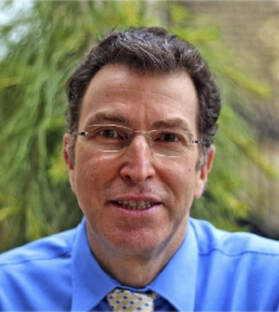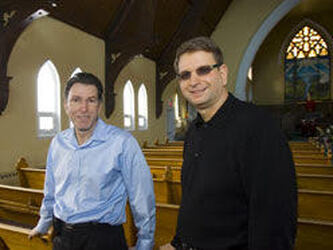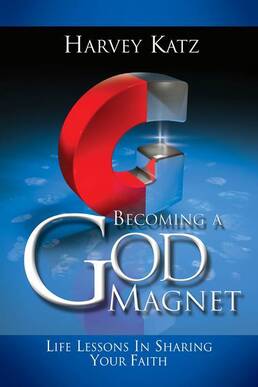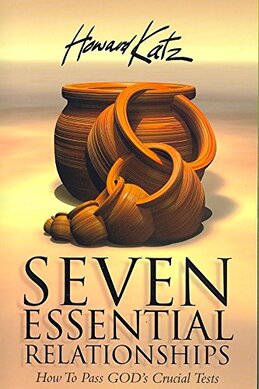 Howard Katz ( 1955–2020) Howard Katz ( 1955–2020) LONDON, ONTARIO – I first got to know Howard Katz, the founding pastor of Open Door Christian Fellowship Church, in the spring of 2008. I was doing up a feature article about him and his younger brother, Harvey, for the old quarterly, Christian Life in London, which was then edited by Rob Hueniken. The hook upon which the article was hung was that both brothers had published books just the year before with Believe Books, the U.S.-based publishing house operated by one of the great heroes of my life, former London mayor, Dianne Haskett. The attentive Hermaneutics reader will know by now that the charismatic/evangelical wing of the Christian church isn’t really my preferred cup of theological tea. But it’s always good to see how the other denominations live and both Katz brothers were delightfully forthright men of manifest intelligence and courage who I couldn’t help but admire. Of particular fascination to this life-long Londoner was that both brothers’ books were shot through with ample reminiscence of growing up Jewish in the Forest City as the sons of Sam Katz – locally known as the Mayor of Cherryhill – who built up the enormous shopping mall and apartment complex through the 1950s and ‘60s. Sam was also a Holocaust survivor and before immigrating to Canada following the Second World War, endured four years in forced labour camps and one year in the notorious concentration camp at Mauthausen, Austria. At the time of our interview in Cherryhill Mall’s executive offices (on a partial second floor which I didn’t even know the mall had), the two brothers were still overseeing the operations of their late father’s company, ESAM, though Howard was already primarily focused on his pastoral work at Open Door on Dundas Street across from the Western Fair grounds. Situated in the area of town where he knew that Christian outreach was most urgently required, Howard devoted twenty-five years of his life to the founding, development and pastoral care of Open Door; work for which he never drew a wage. Harvey, was the first brother to write a book, as he was the first to accept Christ as his saviour on May 3, 1976 at the age of 16. Harvey’s book, Becoming a God Magnet, was an engaging and at times very funny survey of his witness and evangelization over the preceding 30 years. Quite independently, Howard had come to Christ a few months after Harvey in his 20th year while working out of town in construction as part of his engineer’s training. Howard’s book, Seven Essential Relationships, was a more sober, pastoral work, grounded in the Genesis account of the life of Joseph and outlining what he saw as the seven stages of development in a Christian’s relationship with God. Of course when these young Jews became evangelical Christians, their decision caused great distress to their family but at no time in the tumult which their conversion kicked up was anyone rejected or threatened with disowning or shunning. Indeed their father gradually became more and more reconciled to his sons’ decisions, particularly once they married Christian women and half a dozen grandchildren started to arrive on the scene. Late in his life, Sam Katz also accepted Christ as his saviour. “Well, here we are,” I said at our interview’s opening, testing to make sure our voices were being picked up by my finicky tape recorder and simultaneously breaking the ice between us: “Howard, Harvey and Herman – now there’s an alliterative consortium you don’t see every day.” Bless their hearts, they at least gave the appearance of finding that amusing. Here are some transcripts from our conversation:  Howard and Harvey Katz at Open Door Christian Fellowship Church Howard and Harvey Katz at Open Door Christian Fellowship Church HARVEY: We aren’t Rabbinic Jews because we don’t follow Judaism in its present form and we acknowledge that and respect that. But we do consider ourselves Biblical Jews. We believe that we have the heritage of Abraham, Isaac and Jacob and that Jesus Christ is the Jewish Messiah. We would never deny being Jewish or being Christian. I would say that we haven’t converted. Converting implies that we aren’t Jewish anymore. I believe that we have fulfilled our Jewishness. Christianity is Jewish, thank God. Jesus didn’t say, “Well, it didn’t work here, let’s start a new religion.” He fulfilled and extended it to the Gentiles. HOWARD: My Dad being a Holocaust survivor brought death into the forefront for us. We could sense it in our family. Of his entire family, only he and his sister survived. Of course he had animosity towards the Nazis but not the Germans. In fact his business partner and a lot of the people who worked for him were Germans. Harvey went to a Hebrew day school and I went to an Anglican day school. My Dad wasn’t a religious Jew. He’d go to synagogue to socialize but he wouldn’t go on a weekly basis. He was very Jewish culturally. He didn’t see the traditions as having a spiritual value but having a social value. HARVEY: What brought me to Christ was the law. The harder I tried to be a good Jew, the more I couldn’t. Howard didn’t care about the law. He didn’t believe it was true. I did and I was trying to find righteousness by performance and I couldn’t do it. I was never going to be good enough. I thought Christians had to be good enough Jews. They substituted Jesus for God and got the same thing. I didn’t accept Jesus because I was a self-hating Jew. I didn’t want to become a Christian. But it was the fulfillment of being a Jew. When I came to faith in Jesus, then it all made sense. But I was afraid to tell anybody what I had done, especially Dad. It was absolutely devastating for him. That was heart-breaking for us. We loved our Dad. This wasn’t an act of rebellion. HOWARD: When my brother told my Dad originally that he had received Christ, I wasn’t there. My Dad wasn’t super upset. Harvey was sixteen. He was a milder personality. So he came to see me. I had just received the Lord about four weeks before and I was in the washroom brushing my teeth and my Dad comes in and says, “We’ve got a problem with Harvey. He’s under Christian influence.” I almost swallowed my toothbrush. I didn’t want to deny Christ but I wasn’t yet ready to confess Him. I kept that toothbrush in my mouth. Because as long as it was there, I knew I was safe. My Dad kept talking and I kept brushing my teeth until finally he was tired and he left the bathroom. And that was when I learned about Harvey. HARVEY: We had the same anxieties. Our Dad had suffered so incredibly in the Holocaust that all this could seem selfish on our part. It seemed like we were just heaping coals on him. I never thought it wasn’t right but at one point when my Dad had a big meltdown, just for one moment I regretted it. HOWARD: My Dad was hoping I’d give him the key to win Harvey back and I eventually told him, “I believe it too.” It was very painful. We were both in tears. There was a lot of anger there and disappointment but our Dad loved us so much that he didn’t reject us. Not only was there pain because we had accepted Christ but because of the shame he felt in terms of the community because he had failed us. After we received the Lord, we went to the synagogue more than we ever did before. We wanted to honour our father so we went with him every Saturday. He was hoping to win us back but I think it was a little boring for him; that we were getting more out of it than he did. One day I said to him, “Dad, if what I believe is not true, my life will show that out. And if what I believe is true, then the good in my life will bear that out also.” He looked at me and acknowledged it. Instead of one of us saying, “I’m right and you’re wrong,” neither one of us had to push at the other anymore. That was a real turning point in our relationship. In the same way that publishing their books had first brought the Katz brothers to my attention, it was Dianne Haskett who told me that Howard had died on the fourth day of the new year and the new decade. Following the removal of his gall bladder in December of 2018, Howard was diagnosed with stage three cancer which had spread to his lymph nodes, and told he might have six months to live; a sentence which he managed to draw out for twice that long. He expressed such calm and peace of mind at the time of that shattering diagnosis that his doctor asked if Howard understood what he’d just been told.
Oh yes, Howard understood all right. And he expressed what was passing through his mind that day in seven pages of reminiscence which he composed late last year and which were included in a little booklet handed out at the celebration of his life on Saturday the 11th: “When I was given the diagnosis, a supernatural peace and joy immediately filled my heart. I know that no matter what the future holds, I am completely at peace and can trust God and His purpose in this season of my life as well. Thankfully, I have no regrets that I have wasted my life. I have accomplished the things I felt Jesus had for me to do. Every morning when I wake up, I read my Bible and I thank God for my salvation. Each new day affords me the opportunity to continue to love and trust Him. Whether I live fifteen more years or only a few more months, I am not clinging desperately to my life. The best is yet to come – to be with Jesus forever in Heaven.” In compliance with Jewish tradition (which neither brother believes they relinquished), Howard was buried very shortly after his death at Mount Pleasant Cemetery, which is just across the road, appropriately enough, from the Katz family empire of the Cherryhill complex. I was surprised that his commemorative service last Saturday wasn’t held at the Open Door Church, where, in a solemn ceremony last month, Harvey was anointed as the new senior pastor. True, Open Door’s not a really big church but it could have accommodated the three hundred or so souls that Howard supposed might turn out to bid him farewell. But with a crowd I’d estimate at about 1500 – and mourners flying in from such far-flung locations as Israel, Switzerland, Mexico and the U.S. – even the massive Forest City Community Church didn’t have enough seats to go around with people standing in every aisle of the main floor and the balcony. I had a sense of the crush we were in for when I had to get out of our car on the badly-jammed, two-lane Bostwick Road and walked up the long lane to the church through cold, lashing rain; flanked on both sides by parked cars which couldn’t find space in the church parking lot. (It was a wildly inapt comparison but I couldn’t help calling to mind some of the early sequences in the film Woodstock where festival-goers abandoned their cars and set out on foot across farmers’ fields in the direction of the music.) Inside the church, the line-up to sign the guest book was half an hour long. Speaker after speaker at Saturday’s ceremony, talked about the comfort they tried to give to Howard and, invariably, the strength which they in turn drew from Howard throughout his final days and weeks. His daughter-in-law, Abbie (wife of Howard’s second son, Danny) talked about crying her eyes out for twenty minutes straight after Howard announced that he knew his end was drawing close; then pulling herself together for his sake and looking up to see Howard regarding her with concern. “Feel better?” he asked. Perhaps the testimony which I found most powerful came from a recovered addict whose name I didn’t catch. He clearly wasn't accustomed to or comfortable with public speaking but took it on to discharge a debt of homage to his mentor and friend. He said he was “honoured” when Howard’s wife Lena, asked him if he’d like to say a few words. He talked about attending his first service at Open Door at the urging of a friend and going along in a state of complete cynicism and being so touched by Howard’s preaching that he went up for an altar call at the end of that service and “gave my heart to the Lord.” He stuck with that new way of life for three months until he fell back into bad habits under the influence of “false friends” and slid back on down that stinking old drain for another full year. His misery and disappointment in himself throughout that year were regularly punctured once each month by a call from Howard, checking in to see how he was doing; asking if he could be of any help and suggesting it might be strengthening if he made his way back to church. It doesn’t have to be at Open Door, Howard told him. “Get plugged into any church.” In his final remarks, this grateful man looked up at the photo of Howard being projected onto a screen and said, “Thank you for never judging me. I have the hope that I will see you again.”
4 Comments
SUE CASSAN
13/1/2020 08:07:06 am
This is a touching tribute to a pillar of the London community and a man whose life expressed his Christianity. It is wonderful to see those whose faith shines out in their every breath and action.
Reply
Max Lucchesi
14/1/2020 11:02:24 am
Herman, may I again add a little historical background to your eulogy to Howard Katz. One of the great ironies is the historical bitterness and split blood between Islam, Judaism and Christianity. 3 religions all based on the same root. Without going into great detail, southern Arabia prior to Mohammed's birth in 570CE contained many Jewish and Christian Arab settlements. The Arabian Peninsular was an important part of the trade route between the east, through India across the Indian Ocean and onto the Mediterranean and so was the scene of rivalry between the Christian Byzantine and the Zoroastrian Persian Sasanian empires. in 610CE when Mohammed had his first vision, his wife Kadija went to her cousin Waraqa Ibn Nawfal a Hanif, (a man learned in Jewish and Christian theology) for advice.
Reply
Ninian Mellamphy
22/1/2020 02:40:03 pm
Once again, Herman has become an interesting local historian—with his account of the spiritual life of Sam Katz's two sons and the surprising accommodation of those lives by a father who had lived through the Holocaust.
Reply
Karen Lynn (plum) Hasiwar
4/1/2022 10:33:43 am
Well today is January 4th 2022 and I only just heard recently, just after Christmas, Howard passed away two years ago. I'm sad I moved away, and didn't have the right contact to learn of this at the time, to attend such an outward display of love for such a dear man before things happened in 2020 to put a stop to such large funerals.
Reply
Your comment will be posted after it is approved.
Leave a Reply. |
HERMANEUTICS
If you would like to contribute to the ongoing operations of Hermaneutics, there are now a few options available.
ALL LIFE IS A GIFT :
THE IMPORTANCE OF TRADITION :
Archives
June 2024
Categories
|



 RSS Feed
RSS Feed